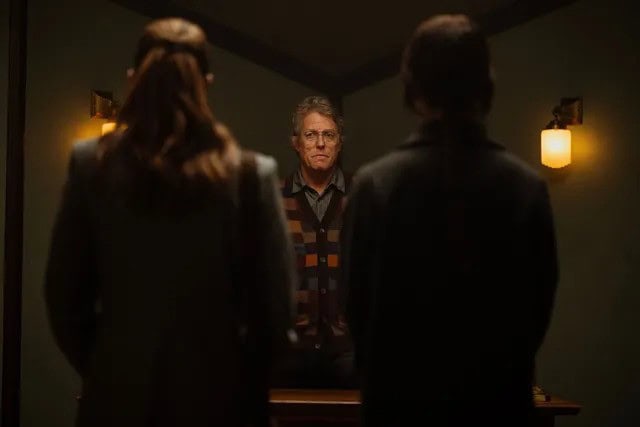Hugh Grant, known for his iconic rom-com roles, takes a dramatic turn as the antagonist in the new A24 horror film Heretic. Directed by Scott Beck and Bryan Woods, the movie stars Grant as Mr. Reed, a seemingly harmless, charming older man who lures two young Mormon missionaries into his home, only to reveal his true sinister intentions. This role marks a new chapter in Grant’s career, showcasing his versatility and ability to pivot from beloved romantic leads to chilling, complex villains.
The casting of Grant as the antagonist was no accident. Beck and Woods specifically sought out an actor who could blend charm and menace, someone capable of disarming the audience before revealing a darker side. From his bumbling, lovable characters in films like Notting Hill and Four Weddings and a Funeral, Grant’s past work created a perfect smokescreen for the villainous twist in Heretic. As the directors put it, they needed an actor who could make the audience feel safe before pulling the rug out from under them, and Grant’s established persona as a comedic and romantic lead was the ideal fit.
In Heretic, Grant’s Mr. Reed welcomes the young missionaries with warmth and hospitality, offering them refreshments and engaging in pleasant conversation. His home, filled with the comforting scent of baking blueberry pie, seems inviting at first. However, as the dialogue unfolds, Reed’s questions become more probing and unsettling, revealing a man with a deep-seated disdain for organized religion. The character’s transformation from charming host to manipulative predator is gradual but striking, capturing the audience’s attention as they watch the facade crumble.
The inspiration for Mr. Reed’s character came from a blend of real-world influences, including controversial figures like Richard Dawkins and Keith Raniere. Grant, known for his attention to detail, worked closely with the directors to flesh out the nuances of the role. He was particularly drawn to the aspect of Reed that mirrors Raniere’s “word salad” tactics, using eloquent but vague language to confuse and dominate his listeners. This element adds a layer of psychological tension to the film, making Reed a more complex and unsettling villain.
Grant’s performance in Heretic is a departure from his earlier work, where he often portrayed affable, hapless characters. The film plays on this established persona, making the audience initially trust Mr. Reed, only to be shocked by his eventual descent into darkness. The directors cleverly use Grant’s history in romantic comedies as a tool to mislead the audience, weaponizing his charisma and charm to create a truly unnerving experience.
Grant’s transition into more villainous roles has been building over the years, with standout performances in Paddington 2 and The Gentlemen, where he played characters that were far from the affable leads of his earlier career. In Heretic, Grant embraces his “villain era” fully, delivering a chilling performance that highlights his range as an actor. By leaning into his established reputation for charm and wit, Grant can subvert expectations, making Mr. Reed one of the most memorable horror villains in recent years.
The dynamic between Mr. Reed and the two young missionaries, played by Sophie Thatcher and Chloe East, is central to the film’s tension. The initial conversations are filled with Reed’s seemingly genuine interest in the missionaries’ beliefs, creating a false sense of security. However, as Reed begins to challenge their faith with his skewed logic, the power dynamic shifts. The audience, much like the characters, slowly realizes the danger too late, adding to the psychological horror of the film.
Heretic marks a significant moment in Hugh Grant’s career, solidifying his ability to take on darker, more complex roles. The film showcases his talent for blending charm with menace, creating a character that is both captivating and terrifying. As the directors continue to explore new avenues in horror, Grant’s performance stands out as a bold and successful experiment in casting against type, proving that even the most beloved rom-com stars can make for unforgettable villains.


